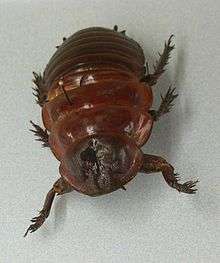Giant burrowing cockroach
| Giant burrowing cockroach | |
|---|---|
 | |
| Scientific classification | |
| Kingdom: | Animalia |
| Phylum: | Arthropoda |
| Class: | Insecta |
| Order: | Blattodea |
| Family: | Blaberidae |
| Genus: | Macropanesthia |
| Species: | M |
| Binomial name | |
| Macropanesthia rhinoceros Saussure, 1895 | |
The giant burrowing cockroach (Macropanesthia rhinoceros) is also known as the rhinoceros cockroach and litter bug. They are native to Australia and mostly found in tropical parts of Queensland. They are the world's heaviest species of cockroach (although Blaberus giganteus is the longest) and can weigh up to 35 g (1.2 oz)[1][2] and measure up to 80 mm (3.1 in)[1] in length. They can live for up to 10 years.[2] Unlike some other cockroaches, they do not have wings and are not considered pests. The cockroach plays a vital part in the ecosystem by consuming dead leaves, eucalyptus in particular, and recycling other matter. True to their name, they may burrow down in soil to a depth of about 1 m (3 ft 3 in),[1] where they make permanent homes. Adult males and females can be differentiated by the size of the "scoop" on the pronotum, which covers the head; the male having a much more pronounced scoop. They grow by shedding their outer shells 12 or 13 times before reaching full size. When a cockroach moults, it will appear pure white except for the eyes. The species is ovoviviparous.
References
- 1 2 3 The rhinoceros cockroach...as a pet?
- 1 2 "Pet facts: giant burrowing cockroaches". Australian Broadcasting Corporation. Retrieved October 2005. Check date values in:
|access-date=(help)
Further reading
- Jex, A. R.; Schneider, M. A.; Rose, H. A.; Cribb, T. H. (2007). "Local climate aridity influences the distribution of thelastomatoid nematodes of the Australian giant burrowing cockroach". Parasitology. 134 (10): 1401–8. doi:10.1017/S0031182007002727. PMID 17445327.
- Woodman, James D.; Cooper, Paul D.; Haritos, Victoria S. (2007). "Cyclic gas exchange in the giant burrowing cockroach, Macropanesthia rhinoceros: Effect of oxygen tension and temperature". Journal of Insect Physiology. 53 (5): 497–504. doi:10.1016/j.jinsphys.2007.01.012. PMID 17374539.
- Brown, W.V; Rose, H.A; Lacey, M.J; Wright, K (2000). "The cuticular hydrocarbons of the giant soil-burrowing cockroach Macropanesthia rhinoceros Saussure (Blattodea: Blaberidae: Geoscapheinae): analysis with respect to age, sex and location". Comparative Biochemistry and Physiology B. 127 (3): 261–77. doi:10.1016/S0305-0491(00)00212-1. PMID 11126757.